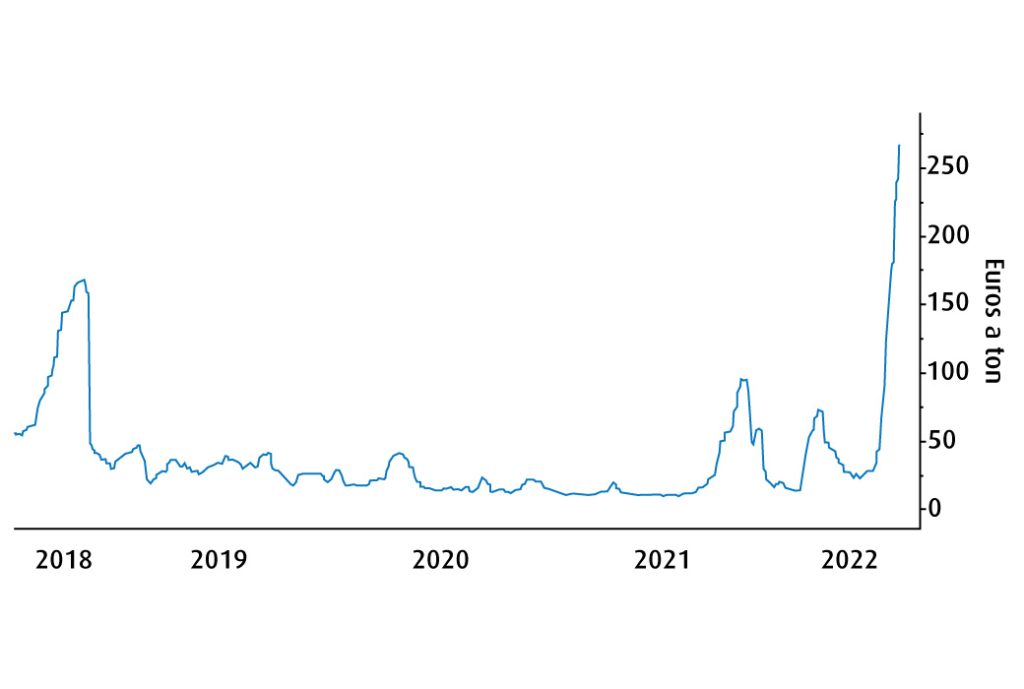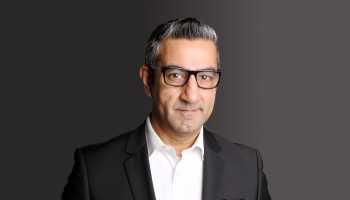Climate change is a hot topic, literally and figuratively. But why should investors keep climate action on their radar? Graham Takata, BMO Global Asset Management’s Director of Climate Change, outlines the risks—and opportunities—of the transition to a net-zero emissions economy.
Why climate action matters for investors
In the summer of 2022, Europe experienced its worst drought in years. It caused water levels on the Danube and other major rivers to drop precipitously—so much so that it exposed sunken German warships from World War II1 and required ships to reduce their cargo2 or run aground. This, in turn, caused a major disruption to the supply chain and raised the cost of shipping for all manner of goods, with knock-on effects for companies around the world. It was a reminder that the consequences of climate change can impact us in unexpected ways —and why climate action should be on every investor’s radar.
Rhine shipping prices soar: The cost of transporting gasoil to Basel in Switzerland

Source: Insights Global, Bloomberg. Data as of August 10, 2022.
A good way to think about the potential impacts of climate change on a business is to consider its physical and transitional risks. Physical risks can be acute storm events such as flooding or longer-term events like drought. These events can incur massive damage to property, like the aftermath of the 2016 Fort McMurray wildfires, or cause soaring food prices. Transitional risks include a broad suite of policy, technological and market-related concerns that arise throughout the transition to a low carbon economy. For example, a logistics company will want to understand how carbon policy could facilitate a shift in shipping from trucks to rail. A REIT will want to know if the buildings they are constructing to today’s standards will still be desirable to tenants in 2050. For asset managers like BMO GAM, it’s important to understand how companies are considering and managing those risks. But it’s also important to understand the opportunities that will arise, both domestically and globally, during the transition to a net-zero emissions economy.
As investors, the question we’re really asking is—what will the world look like in 2050?
In change, opportunity
As investors, the question we’re really asking is—what will the world look like in 2050? And what do we need to do to create a low carbon economy?
We hear a lot about the challenges of a low carbon transition, but not as much about the wealth of opportunities for investors. Beyond well-known areas like green energy, the low-carbon economy will need investments in smart infrastructure, metals, mining, energy storage, electric vehicles, agriculture, supply chain, and more. All of these industries have a role to play as we build a more sustainable economy.
It is important to stress that a low-carbon economy is not achieved by simply capping or limiting economic activity to stay within planetary carbon boundaries. Instead, we need to focus on “decoupling” productivity from emissions altogether, such that economic growth and prosperity can continue in a way that is sustainable for people and the planet. That will take an incredible transformation of the real economy.
To get there, the products, services, and businesses of today will need to transition to a new, low-carbon paradigm while maintaining what makes them viable in the first place. In the words of Janet Yellen4, “the flow of capital from carbon-intensive to carbon-neutral investments is probably the most dramatic and predictable economic shift in human history.” As we look to navigate the transition, better insight into what 2050 will look like provides a distinct advantage in understanding opportunities today.
Interested in opportunities in the green transition? The BMO Clean Energy Index ETF (ZCLN) tracks the S&P Global Clean Energy Index, providing liquid and tradable exposure to a target of 100 companies from around the world that are involved in clean energy-related businesses. The BMO Brookfield Global Renewables Infrastructure Fund (GRNI) is an actively managed ETF series that focuses on renewable power and infrastructure, clean technology, and water sustainability with an emphasis on infrastructure-like attributes to help mitigate risk.
Connecting the dots: the role of an asset manager
The world is intimately connected, and as an asset manager, BMO GAM can play a role by helping to connect the dots and bring climate-related risks to the surface, including those that people might not typically associate with climate change.
For us, climate action isn’t just about the companies in which we invest. As part of our stewardship activities, we also work with regulators and policymakers on effective climate policy. This past year, some of our most significant milestones involved direct engagement with the Canadian Securities Administrators (CSA), the Security and Exchange Commission (SEC) in the United States, and the International Sustainability Standards Board (ISSB) to share our insights and feedback in support of mandatory climate disclosures, which will improve an investor’s capacity to assess climate risks and identify opportunities.
If there’s a persistent theme to the transition to a sustainable economy, it’s that no one can do it alone—not governments, not companies, and not the financial sector. It’s this interconnectedness that guides our engagement and stewardship approach. That’s why, in addition to engaging directly with companies, we also engage with governments on emerging climate policy, and industry associations like the Pathways Alliance, which leads the net zero strategy of Canada’s largest oil sands producers, to support sector-wide progress on decarbonization. We also engage collaboratively with other investors. One such collaborative engagement was with TransAlta, whom we encouraged to set more ambitious targets through our Climate Engagement Canada collaboration, and in response TransAlta accelerated their net zero ambition to 2045 from 2050.
BMO GAM’s 2022 climate highlights
BMO GAM’s engagement with the CSA, SEC, and ISSB on mandatory climate disclosures are just some of the major milestones featured in BMO GAM’s Responsible Investment 2022 Annual Report, which was recently released. Other highlights include:
- Net Zero Asset Managers (NZAM) Initiative: In 2021, BMO GAM became the first Canadian asset manager to commit to NZAM, an ambitious global initiative supporting the Paris Agreement and the transition to a net-zero economy. Last year, we expanded our commitment to 15 funds, meaning that 11.7% of our strategies5 are now managed in line with these climate goals. These funds are supported with a deeper level of climate analytics and a more concentrated focus on engagement with the companies held by the funds. Between our own efforts and participation in collaborative initiatives like NZAM, we’re currently engaging with companies representing over 90% of the carbon emissions within these 15 funds. Taking an active role in supporting decarbonization remains one of our primary goals, and we aim to increase our commitment further over time.
- Climate Action Campaigns: BMO GAM launched our first two climate action campaigns in 2022. Each campaign pairs one of our five climate sub-themes with a relevant sector to better evaluate climate risks within our portfolio. The sub-themes address different classes of underlying issues we believe to be material to us as investors, including:
-
- Attaining net zero emissions – Accelerating decarbonization of the economy toward net-zero emissions before 2050
- Clean energy transformation – Transforming energy supply systems and use to power a sustainable future
- Climate resiliency – Building capacity to adapt and thrive in current and future climate conditions
- Protecting our natural capital – Being responsible stewards of natural capital and critical ecosystem services
- Advancing a circular economy – Fostering supply chain innovation and efficiency to minimize waste and advance toward a circular economy
Our natural capital campaign evaluates food and agriculture companies’ exposure to land, water, ecosystem services, and biodiversity-related risks. Issues include sustainable land use practices, illegal deforestation, operation in water-stressed areas, and biodiversity, all of which can affect supply chains and other business operations.
Our climate resiliency campaign focuses on the real estate and construction sector, as we look more closely at physical risks to assets from increasingly severe climate events like wildfires, hurricanes, and floods. Real estate and construction companies expect the buildings they construct to last for 50 to 100 years. That’s why investors must pay special attention to future-proofing their assets to meet current and future demand for high-performing green buildings.
Taking a sector-wide approach with our climate action campaigns enables us to evaluate performance relative to peers in a way not achieved through conventional one-on-one engagements. It also allows us to identify opportunities within our portfolios by understanding how leading companies are implementing on climate action. Over time, we expect to launch similar campaigns for our other climate sub-themes.
If there’s an overall message worth stressing—one big takeaway for investors—it’s the momentum that is building on climate action.
The big takeaway: momentum
As our Responsible Investment 2022 Annual Report shows, the past year has featured a multitude of great climate-related stories, both at BMO GAM and globally. If there’s an overall message worth stressing—one big takeaway for investors—it’s the momentum that is building on climate action. That momentum is growing on all fronts: government agencies, regulators and investors are working together to create new policies, practices, and legislation, including carbon disclosure requirements; the Taskforce on Nature-related Financial Disclosures (TNFD) was launched, building on the success of the Task Force on Climate-related Financial Disclosures (TCFD); the Kunming-Montreal Global Biodiversity Framework was adopted at December’s COP15 conference; and at BMO GAM, we again raised the bar on climate action through new engagements and initiatives, and by more deeply integrating ESG considerations into the way we do business.
It’s an exciting time, and we’re proud to be a part of the transition to a greener and more sustainable economy.
Certain of the products and services offered under the brand name BMO Global Asset Management are designed specifically for various categories of investors in a number of different countries and regions and may not be available to all investors. Products and services are only offered to such investors in those countries and regions in accordance with applicable laws and regulations.
This communication is intended for informational purposes only and is not, and should not be construed as, investment, legal or tax advice to any individual. Particular investments and/or trading strategies should be evaluated relative to each individual’s circumstances. Individuals should seek the advice of professionals, as appropriate, regarding any particular investment. Past performance does not guarantee future results.
Any statement that necessarily depends on future events may be a forward-looking statement. Forward-looking statements are not guarantees of performance. They involve risks, uncertainties and assumptions. Although such statements are based on assumptions that are believed to be reasonable, there can be no assurance that actual results will not differ materially from expectations. Investors are cautioned not to rely unduly on any forward-looking statements. In connection with any forward-looking statements, investors should carefully consider the areas of risk described in the most recent simplified prospectus.
All figures and statements are as of month end unless otherwise indicated. Performance is calculated before the deduction of management fees. Past performance is no guarantee of future results.
Commissions, management fees and expenses (if applicable) all may be associated with investments in BMO ETFs and ETF Series of the BMO Mutual Funds. Please read the ETF facts or prospectus of the relevant BMO ETF or ETF Series before investing. BMO ETFs and ETF Series are not guaranteed, their values change frequently and past performance may not be repeated.
For a summary of the risks of an investment in the BMO ETFs or ETF Series of the BMO Mutual Funds, please see the specific risks set out in the prospectus. BMO ETFs and ETF Series trade like stocks, fluctuate in market value and may trade at a discount to their net asset value, which may increase the risk of loss. Distributions are not guaranteed and are subject to change and/or elimination.
BMO ETFs are managed by BMO Asset Management Inc., which is an investment fund manager and a portfolio manager, and a separate legal entity from Bank of Montreal. ETF Series of the BMO Mutual Funds are managed by BMO Investments Inc., which is an investment fund manager and a separate legal entity from Bank of Montreal.
BMO Global Asset Management is a brand name under which BMO Asset Management Inc. and BMO Investments Inc. operate.
®/™Registered trademarks/trademark of Bank of Montreal, used under licence.




